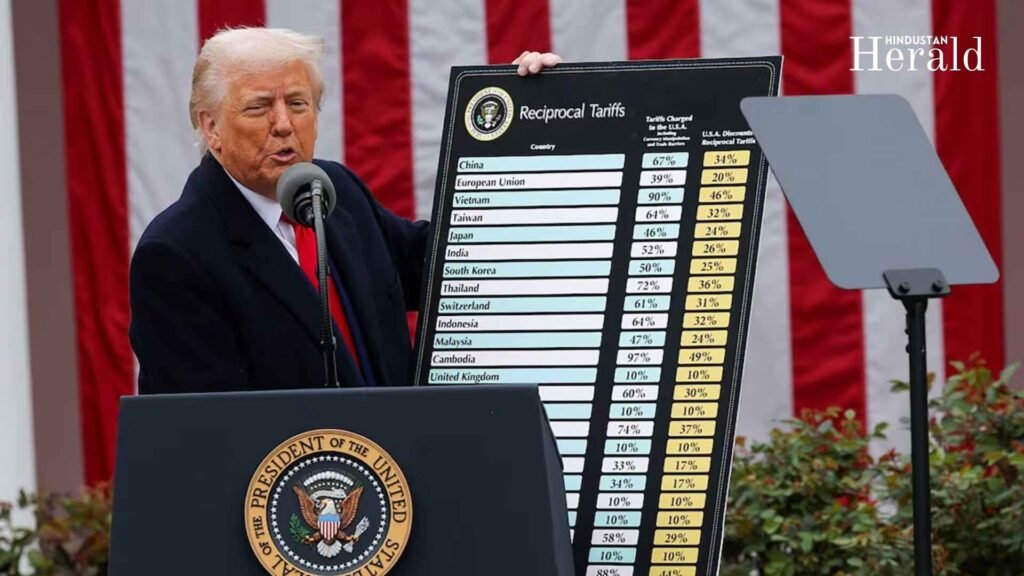
Key Highlights:
Washington D.C., April 3
In a sweeping and controversial move that may upend global trade dynamics, U.S. President Donald Trump announced a new wave of reciprocal import tariffs during a rally-style event titled “Make America Wealthy Again” on Wednesday. Among the nations hit hardest is India, which now faces a 26 percent import duty on its exports to the U.S., as per Trump’s new tariff policy.
India Faces 26% Tariff: “Not Treating Us Right”
Despite calling Indian Prime Minister Narendra Modi a “great friend,” Trump made it clear that India’s high duties on American goods were unacceptable. He criticized India for charging a 52 percent tariff on U.S. goods while the U.S. charged “almost nothing” in return.
“India very, very tough. The Prime Minister just left and is a great friend of mine, but you are not treating us right,” Trump said at the event.
“They charge us 52 per cent and we charge them almost nothing…”
This direct reference to PM Modi comes amidst increasing tension over trade imbalances between the two democracies.
Trump’s Global Tariff Framework
Trump detailed the specific import duties the U.S. would now impose on key global trading partners:
- China – 34%
- European Union – 20%
- Vietnam – 46%
- Taiwan – 32%
- Japan – 24%
- India – 26%
- Bangladesh – 37%
- Pakistan – 29%
- Sri Lanka – 44%
- Israel – 17%
- United Kingdom – 10%
In addition, all foreign-made automobiles will now carry a flat 25 percent import tax, a move Trump claimed was aimed at safeguarding America’s “industrial base” and national security.
Trump’s “Declaration of Economic Independence”
Calling it a “historic day,” Trump claimed this bold economic policy would reset decades of unfair trade practices that he blamed on prior U.S. administrations.
“Effective at midnight, we will impose a 25% tariff on all foreign-made automobiles,” Trump declared, emphasizing urgency and decisiveness.
“Such horrendous imbalances have devastated our industrial base and put our national security at risk… I don’t blame these other countries at all for this calamity. I blame former presidents and past leaders who weren’t doing their job.”
The tariffs, he said, were a “Declaration of Economic Independence”, representing a seismic shift in America’s approach to international commerce.
Criticism of Trade Policies in Asia
Trump specifically took aim at Asian economies, criticizing the vast disparity in motorcycle import tariffs:
“The United States charges other countries only a 2.4% tariff on motorcycles. Meanwhile, Thailand and others are charging much higher prices like 60%, India charges 70%, Vietnam charges 75%.”
This, he claimed, was proof of exploitative trade practices that needed immediate correction.
Immediate Implementation
The White House confirmed that the new tariff policies would take effect immediately. U.S. Treasury Secretary Scott Bessent had earlier hinted that the announcement would come at 4 pm Washington time, and companies should prepare to absorb the cost impacts right away.
Spokesperson Karoline Leavitt also warned that businesses could either absorb the costs, renegotiate with suppliers, or pass on the costs to consumers — risking price hikes across sectors.
Economic Ramifications: A Risky Gamble?
While Trump touted the tariffs as a mechanism to bring jobs back and strengthen domestic industry, economists and international trade experts remain divided. Critics warn that:
- U.S. consumers could face higher prices.
- Global supply chains may be disrupted.
- Retaliatory tariffs could follow from countries like India and China.
- The likelihood of a trade war or economic slowdown could increase.
Trump, however, remained bullish on the impact:
“Our country and its taxpayers have been ripped off for more than 50 years. But it is not going to happen anymore.”
What It Means for India
The 26 percent import duty on Indian goods is likely to hurt India’s exporters, particularly in sectors like automobiles, textiles, motorcycles, and agriculture — all major components of India’s U.S.-bound trade.
With India already charging high import tariffs on American goods, this move could trigger retaliatory measures from New Delhi or lead to fresh diplomatic discussions on fair trade.
While PM Modi and Trump have long maintained a cordial personal relationship, this economic policy may test the resilience of Indo-US trade ties going forward.
The announcement of Donald Trump’s import tariffs marks a pivotal moment in global economic policy. With India now facing a 26% tariff, along with similar actions against other major economies, the geopolitical and trade landscape may witness significant turbulence in the weeks ahead.
As the world waits for global markets to react and political stakeholders to respond, one thing is certain — the era of easy trade with the United States may be over.
The Hindustan Herald Is Your Source For The Latest In Business, Entertainment, Lifestyle, Breaking News, And Other News. Please Follow Us On Facebook, Instagram, Twitter, And LinkedIn To Receive Instantaneous Updates. Also Don’t Forget To Subscribe Our Telegram Channel @hindustanherald
